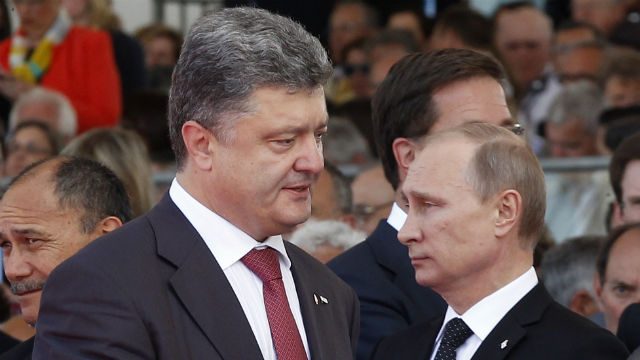SUMMARY
This is AI generated summarization, which may have errors. For context, always refer to the full article.

BRUSSELS, Belgium – Russia and Ukraine resumed talks in Brussels on Tuesday, June 10, to end a bitter gas price dispute and build on a tentative push by Kiev’s new president towards peace after months of conflict.
Ukraine’s new Western-backed president Tuesday ordered the creation of humanitarian corridors in the separatist east that could save civilians and advance his plan to end nearly two months of fighting by the end of the week.
Petro Poroshenko’s initiative meets a major demand put forward by Moscow and helps address growing concern among rights groups about Kiev’s use of firepower in heavily populated areas to suppress the pro-Russian insurgency.
But the 48-year-old chocolate baron and political veteran stopped short of accepting the Kremlin’s request to allow Russian aid into the eastern rustbelt – a move Kiev fears could be used to help arm the rebels.
Russia said the corridor decision was “welcome” but left room for concern that Poroshenko might only step up his offensive once civilians leave for safer parts of Ukraine.
“Military operations are continuing and even intensifying in a number of cases,” Foreign Minister Sergei Lavrov said after meeting his German and Ukrainian counterparts in Saint Petersburg.
But German Foreign Minister Frank-Walter Steinmeier said he saw “the light at the end of the tunnel” and a “readiness from all sides to act to de-escalate the crisis.”
Poroshenko has unveiled plans to end the rebellion that has killed more than 200 and shaken the foundation of the splintered ex-Soviet state.
Elusive gas deal
His efforts include high-stakes negotiations to stave off a Russian gas cut that would also impact Europe and plunge economically-devastated Ukraine into even deeper recession.
Another marathon round of EU-mediated gas talks broke up in Brussels early Tuesday and ministers returned to the EU capital later in the day after consultations with their respective governments.
News agency reports in Russia said Russian Energy Minister Aleksandr Novak conferred with President Vladimir Putin at the Kremlin to apprise him on where the laborious gas price talks stood for now.
EU Energy Commissioner Guenther Oettinger, the broker for the crunch gas talks, said an overall agreement should not be expected for days.
Russia had set a deadline for Ukraine to cover a debt Moscow puts at $4.5 billion or have its shipments end Wednesday.
Ukraine has refused to pay the gas bill in protest at Russia’s decision to nearly double its rates in the wake of the February ouster of Kiev’s Kremlin-friendly president after months of pro-EU protests.
About 15% of Europe’s gas from Russia transits through Ukraine – a dependence that EU nations have been trying to limit ever since suffering similar disruptions in 2006 and 2009.
Analysts had expected the two sides to agree to a new price of around $350 per thousand cubic meters of gas – a sum about halfway between Russia’s old rate and the one set after the rise to power of the new pro-Western authorities.
But Kiev appears to be taking a hardline position by demanding the same price Russia awarded the previous authorities.
Intensified fighting
The multipronged peace push by Poroshenko received only suspicion by the pro-Russia rebels in the East.
A top leader in the self-proclaimed “Donetsk People’s Republic” said the level of violence inflicted on the region made him doubt the real intention behind Poroshenko’s civilian corridors.
“We heard about this initiative but doubt it will come into force,” Donetsk “deputy governor” Andriy Purgin told Russia’s Interfax news agency.
The government’s assault – dubbed an “anti-terrorist operation” by Kiev and a “punitive operation” by Moscow – has gathered considerable momentum since Poroshenko’s May 25 election.
The fighting has engulfed two economically-vital regions that are home to seven million people and have extensive trade and cultural ties to Russia.
The battles are now primarily being waged along Ukraine’s border with Russia and outside Slavyansk – a city of 120,000 that was the first of a dozen to fall under rebel command in early April.
A Ukrainian military source told Agence France-Presse that government forces had also successfully repelled a second attempt by guerrillas to seize the main airport in the neighboring region of Lugansk since the weekend.
But rights groups question whether Ukraine’s growing reliance on artillery fire in Slavyansk and neighboring towns was entirely justified.
“Criminal conduct by the insurgents does not relieve the Ukrainian forces of their obligations to act in accordance with international law,” Human Rights Watch said in a letter to Poroshenko. – Rappler.com
Add a comment
How does this make you feel?
There are no comments yet. Add your comment to start the conversation.